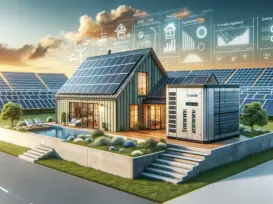Grus Home Energy - Solar Energy Systems
Harnessing the Power of the Sun: Innovative Solar Energy Systems for Sustainable Living
Harnessing the Power of the Sun: Innovative Solar Energy Systems for Sustainable Living
As the world increasingly seeks sustainable energy solutions, solar energy systems stand out as one of the most promising and accessible technologies. The quest for clean, renewable power sources has never been more critical, with climate change and the depletion of fossil fuels driving the urgent need for alternatives. Solar energy, harnessed from the sun’s rays, offers a plentiful and renewable resource that can significantly reduce our carbon footprint.
Solar energy systems convert sunlight into electricity using photovoltaic (PV) cells. These cells, made from semiconductor materials such as silicon, generate an electrical current when they are exposed to sunlight. This process, known as the photovoltaic effect, is the cornerstone of solar power technology. Over the years, advancements in PV cell efficiency have made solar energy increasingly viable and cost-effective for residential, commercial, and industrial applications.
One of the most common types of solar energy systems is the solar panel array. These panels are installed on rooftops or in large, open areas where they can capture maximum sunlight. They are connected to an inverter, which converts the direct current (DC) produced by the panels into alternating current (AC), the form of electricity used in homes and businesses. Excess energy can be stored in batteries for use when the sun isn’t shining, or fed back into the power grid, often for a credit on electricity bills.
Another innovative aspect of solar energy systems is the integration of smart technology. Many modern systems come equipped with monitoring software that allows users to track energy production and consumption in real-time. This enables homeowners and businesses to optimize their energy use, increase efficiency, and even participate in smart grid programs.
Solar energy is not just limited to generating electricity. Solar thermal systems use the sun’s heat to warm water or air for residential and commercial heating purposes. These systems are particularly effective in sunny climates and can significantly reduce reliance on traditional heating fuels, such as natural gas or oil.
The versatility of solar energy systems extends beyond stationary installations. Portable solar panels and solar-powered chargers have become popular for outdoor enthusiasts and those living in remote areas. These mobile solutions provide power on-the-go, ensuring access to electricity without the need for grid connections.
Community solar projects are another emerging trend, allowing individuals who may not have suitable roofs or live in apartments to benefit from solar power. Participants can subscribe to a portion of a large solar array located elsewhere and receive credits on their electricity bills for their share of the power produced.
Despite the numerous benefits, solar energy systems do face some challenges. The initial cost of installation can be high, though this is often offset by long-term savings on energy bills and various incentives offered by governments and utilities. Additionally, solar panels require a significant amount of space and are dependent on weather conditions, although technological advancements continue to improve efficiency and storage capabilities.
In conclusion, solar energy systems represent a critical component of the global shift toward renewable energy. With continuous advancements, they are becoming more efficient, versatile, and affordable, making solar power an increasingly attractive option for sustainable living. As we move forward into a future where environmental concerns are paramount, embracing solar energy is an essential step toward a cleaner, greener, and more resilient energy landscape.
©2025 All Rights Reserved. Grus IoT Co.,Ltd.
